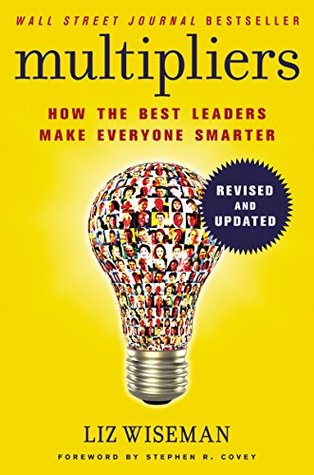More on this book
Community
Kindle Notes & Highlights
by
Liz Wiseman
Read between
August 12 - August 27, 2023
“If you don’t have any facts, we’ll just use my opinion.”
Multipliers let people know what will be done with their thinking and their work. With this sense of closure, people around them are assured that their discretionary effort won’t be wasted, and they are likely to give 100 percent the next time. In this way Multipliers get full contribution not just once but over and over again.
Instead of framing issues for debate and decisions, Diminishers tend to raise issues abruptly, then dominate the discussion before forcing a decision.
“Freedom is hammered out on the anvil of discussion, dissent, and debate.”
When you give that pen back, your people know they are still in charge.”
Multipliers understand that their role is to invest, to teach, and to coach, and they keep the accountability for the play with the players.
Multipliers have a core belief that people are smart and will figure things out.
Diminishers don’t trust others to figure it out for themselves, so they maintain ownership.
When these leaders bungee in and out of their own organization, they create dependency and disengagement. When they strike at random, they produce disruptive chaos.
Help them find a way to be successful next time.
What solution(s) do you see to this problem? How would you propose we solve this? What would you like to do to fix this?
When leaders set the pace, they are more likely to create spectators than followers.
How might I be shutting down the ideas and actions of others, despite having the best of intentions? What am I inadvertently doing that might be having a diminishing impact on others? How might my intentions be interpreted differently by others? What messages might my actions actually be conveying? What could I do differently?
“I can’t control the ideas that pop into my head, but I can control the ones that come out of my mouth.”
The best way out of a diminishing death spiral is through multiplication—using the logic of multiplication and leading like a Multiplier yourself.
They choose to turn down the volume, reducing the Diminisher’s intrusion into their head and the other person’s consumption of their life and psychic energy.
When you retreat and regroup, you give the Diminisher a way out as well—an opportunity to gracefully rethink an issue and to save face.
The next time someone gives you a statement of work, ask to begin with a problem definition instead.
Multipliers enjoy finding other people’s genius and engaging it.
“How can we make this even better?”
“Diminishers want to be heard. They want to know that the ideas that they put forth are really good ideas. If you start by acknowledging their worth and that their ideas do have merit, you’ve got a good beginning.”
Consider breaking this cycle by talking frankly about your mishaps and sharing what you’ve learned, both from successes and failures.
Set the tone by readily admitting your mistakes, sharing your learning, and letting the boss know that you’re smarter each time. Doing so will reinforce a core Multiplier belief that people are smart and can learn from their mistakes and figure it out.
“The silence creates the space. The space creates results.
If you want to build a brilliant organization, don’t just settle for your own aha moment: build a Multiplier culture, one that generates Multiplier moments every day and between everyone in the organization.
Instead of asking, “Is this person smart?” ask, “In what way is this person smart?”


